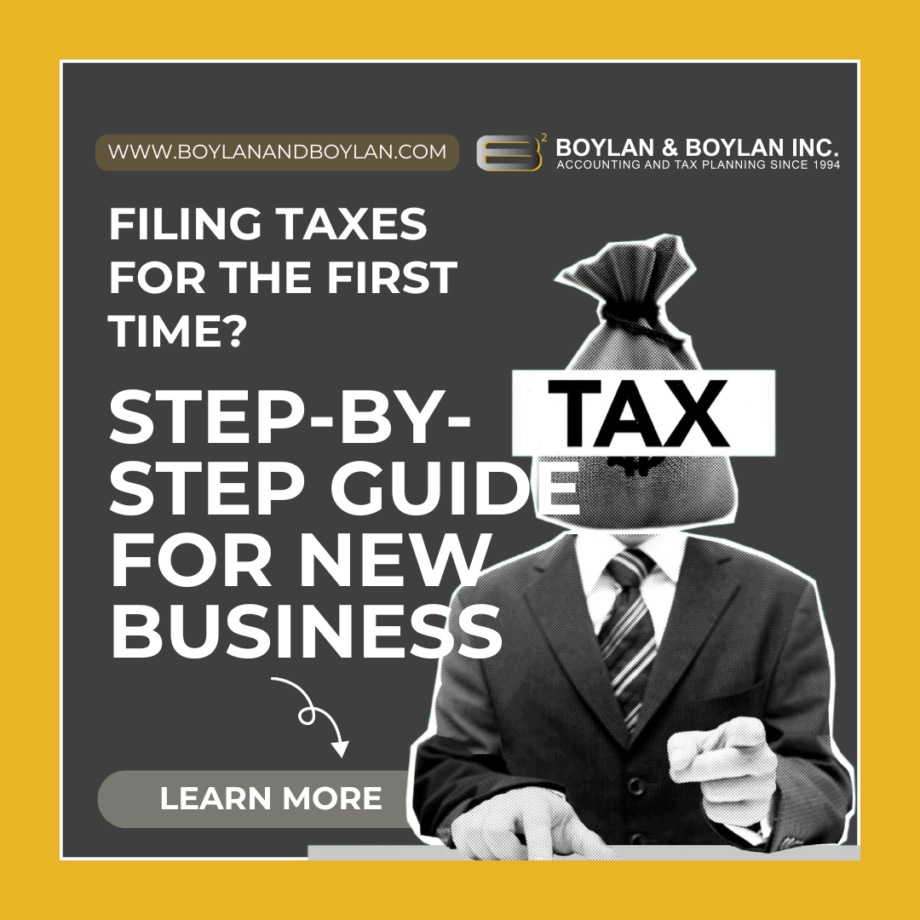Starting a new business is an exciting journey filled with ambitions and challenges. One crucial milestone that every entrepreneur must navigate is filing taxes for the first time. Understanding tax obligations can seem daunting, but with the right guidance from seasoned experts like those at Boylan and Boylan, you can approach tax season with confidence. This blog provides a beginner’s guide to the tax filing process, offering tips to avoid common pitfalls and ensure compliance with ease.
Step 1: Understand Your Tax Obligations
The first step in filing your business taxes is to understand what kind of taxes you need to pay. Depending on your business structure (such as sole proprietorship, partnership, LLC, or corporation), your tax obligations might vary. Generally, most businesses are responsible for:
- Income taxes on profits
- Employment taxes for employees
- Sales taxes for products and services
- Excise taxes, if applicable
At Boylan and Boylan, we help you identify your specific tax obligations based on your business model and ensure that no detail is overlooked.
Step 2: Organize Your Financial Records
Good bookkeeping is essential for hassle-free tax preparation. Ensure that all financial records, such as sales receipts, payroll records, and previous tax returns, are well organized. Using accounting software like QuickBooks can streamline this process, allowing for accurate record-keeping and easy retrieval of financial information when needed.
Step 3: Determine Your Tax Deductions and Credits
One of the advantages of thorough tax planning is identifying potential deductions and credits that can reduce your tax liability. Common deductions for new businesses include:
- Home office expenses
- Business travel and meals
- Start-up costs
- Equipment and supplies
Boylan and Boylan’s tax professionals can help you navigate these options and ensure that you’re taking advantage of all applicable tax benefits.
Step 4: Choose the Right Filing Status
Choosing the correct filing status is crucial as it impacts how much you pay in taxes. Your business structure affects this choice, and it might change as your business grows. Consulting with a tax professional ensures that you select the most beneficial status for your situation, potentially saving money and avoiding legal issues.
Step 5: Fill Out and File Your Tax Forms
Filing your taxes involves filling out the right forms, which vary based on your business structure:
- Sole proprietors file Schedule C with their personal tax returns.
- Partnerships use Form 1065.
- Corporations file their taxes using Form 1120 or 1120S.
Boylan and Boylan can assist in accurately completing these forms and submitting them either electronically or on paper, depending on your preference.
Step 6: Pay Your Taxes
Once your tax return is prepared, it’s time to pay any taxes owed. This might be done in a lump sum or through estimated quarterly payments. It’s crucial to pay on time to avoid penalties and interest. Our team can guide you on the best practices for scheduling payments and keeping track of all deadlines.
Step 7: Plan for Next Year
After filing your first tax return, the next step is planning for the following year. This involves adjusting your tax strategy based on the previous year’s outcomes and preparing for new tax laws that might affect your business.
Boylan and Boylan offer strategic tax planning services that not only prepare you for annual tax filing but also help optimize your financial strategies to support business growth and sustainability.
Avoid Common Pitfalls
New business owners often encounter several common tax pitfalls:
- Mixing Personal and Business Finances: Always keep personal and business accounts separate to simplify bookkeeping and tax preparation.
- Ignoring Tax Deadlines: Missing deadlines can result in penalties and interest. Keeping a calendar of tax deadlines can help.
- Failing to Keep Adequate Records: Maintain detailed records of all business transactions to defend deductions if audited by the IRS.
Conclusion
Filing taxes for the first time can be complex, but with guidance from Boylan and Boylan, you can navigate this challenge successfully. Our expert team ensures that you understand your tax obligations, benefit from all potential deductions, and comply with tax laws to avoid any issues. Remember, effective tax planning is a year-round process that can significantly impact your business’s financial health.
For personalized advice and professional assistance, reach out to Boylan and Boylan, where your business’s success is our top priority. Let us help you turn tax time into a strategic advantage for your new venture!
4

